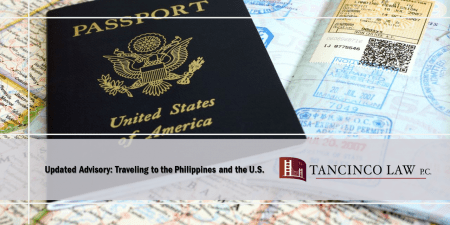Traveling to the Philippines
According to the guidance issued by the Philippines Bureau of Immigration (BI), individuals in the following categories should be allowed to enter the Philippines, subject to the maximum capacity of inbound passengers at the port and date of entry, until further notice:
- Foreign nationals with valid and existing visas at the time of entry;
- Foreign nationals allowed entry under the Balikbayan Program (RA6788), provided they are nationals from non-visa-required countries under Executive Order 408:
- Former Filipino citizens, together with their foreign spouses and children, regardless of age, who are travelling with the former Filipino citizens; and
- Filipino citizens’ spouses and children, regardless of age, who are travelling with the Filipino citizen.
- Foreign nationals who are holders of valid and existing Special Resident Retiree’s Visas (SRRV), may be allowed entry without the need for an Entry Exemption Document (EED).
- Foreign nationals who are holders of valid and existing 9(a) or Temporary Visitor’s Visas, provided they present, upon arrival, an EED issued by the Department of Foreign Affairs (DFA).
Except for Section 9(e) visa holders who are covered by different testing and quarantine protocols, the entry of all other foreign nationals shall be subject to the following conditions:
- With pre-booked accommodation for at least ten nights in a quarantine hotel/facility; and
- Subject to COVID-19 testing at the quarantine hotel/facility on the seventh day from date of arrival.
Arriving passengers who are fully vaccinated in the Philippines shall be required to undergo a seven-day facility-based quarantine upon arrival, with the day of arrival being the first day.
A fully vaccinated individual must carry his or her vaccination card, which must be verified prior to departure, as far as practicable. This document must be presented to the dedicated Bureau of Quarantine (BOQ) representative for verification at the Department of Transportation One-Stop-Shop (OSS) upon arrival in the Philippines.
Traveling to the United States
All airline passengers traveling to the United States, including U.S. citizens and Lawful Permanent Residents (LPRs), are required to provide proof of a negative COVID-19 viral test or recovery from COVID-19.
Effective January 26, 2021 all airline passengers to the United States ages two years and older must provide either a negative COVID-19 viral test taken within three calendar days of travel or provide a positive test result and documentation from a licensed health care provider or public health official of having recovered from COVID-19 in the 90 days preceding travel. Passengers must also attest, under penalty of law, to having received a negative qualifying test result or to recovery from COVID-19 and medical clearance to travel.
Airlines must deny boarding to passengers who do not meet these requirements. U.S. citizens in countries where adequate COVID-19 testing is not available or may not be able to satisfy the requirements, should depart immediately or prepare to be unable to return to the United States until such time as they can meet the requirements.
(This update is current as of June 4, 2021.)


